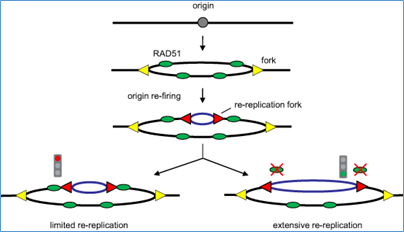PREVIOUS
RAD51 Protein
March 13 , 2024
642 days
680
0
- Researchers observed that RAD51 temporarily binds to the newly synthesized DNA.
- Thus, RAD51 prevents genomic duplications that could arise from re-activated origins.
- Every time a cell divides, its DNA is duplicated so that the two daughter cells have the same genetic material as their parent.
- This means that millions of times a day a biochemical wonder takes place in the body: the copying of the DNA molecule.
- It is a high-precision job carried out by specific proteins and includes systems to protect against potential errors that could lead to diseases such as cancer.
- When a region of DNA is over-replicated, breaks are created in the molecule, and the likelihood of a cancer-related gene being over-expressed increases.
- Therefore, avoiding excess replication prevents DNA damage and reduces the chances of oncogenes being amplified.

Leave a Reply
Your Comment is awaiting moderation.


